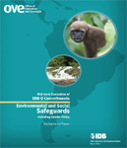IDB-9: Environmental and Social Safeguards, Including Gender Policy
Date
Mar 2013
This paper reviews to what extent and how effectively the Inter-American Development Bank (IDB, or Bank) is implementing the IDB-9 requirements pertaining to environmental and social safeguards policies. The Bank's commitment to sustainability is enshrined in the Environmental and Safeguards Compliance Policy and policies addressing social concerns: involuntary resettlement, indigenous peoples, and gender equality. Each policy promotes sustainability through a two-pronged approach: mainstreaming of environmental and social concerns, and safeguards. The IDB-9 requirements called on the Bank to adopt a new set of environmental and social safeguards consistent with the findings of an external assessment by an Independent Advisory Group (IAG). IDB-9 also called for the adoption of a new Gender Equality Policy. The IAG assessment (which was completed after the IDB-9 Agreement) concluded that a revision of the Bank's safeguards policies was not warranted, but it recommended actions to help the Bank strengthen its mainstreaming of sustainability concerns and application of safeguards. Management and the Board accepted this conclusion. Thus in terms of the IDB-9 mandate, the Bank has not revised its safeguards policies, but it has adopted the Gender Equality Policy. It also launched an action plan to address IAG¿s concerns. This review finds that the Bank's action plan is substantially responsive to the concerns raised by IAG and that progress on most actions is well under way, though further work is needed. It also finds that implementation of the Gender Action plan has made a good start. Mainstreaming of sustainability concerns remains work in progress. The Bank's Sustainability Working Group has helped raise Management's overall awareness of sustainability issues, but the Bank has not yet found an effective way to integrate sustainability into its Country Strategies. Similarly, gender sector notes have not yet resulted in consistent integration of gender equality into Country Strategies. For projects, in about one-fifth of those approved in 2012 (January - September), the results matrix includes gender indicators of varying relevance and quality. On the safeguards side, progress has been made on integrating safeguards specialists into private sector operational teams, and the Bank has embarked on a more rigorous approach to supervision of safeguards implementation. Piloting of the gender safeguard has started recently. However, pressure to reduce project preparation times and an increase in high-risk projects seem to have resulted in the Bank's shifting some important safeguards due diligence work from the preparation to the supervision phase¿a change the Bank's supervision system is not equipped to handle well. The paper offers several suggestions to advance the sustainability agenda: (i) ensure that the environmental and social assessment process is consistently completed before project approval; (ii) strengthen safeguards supervision; (iii) increase attention to the social aspects of sustainability, (iv) broaden the focus of country environment sector notes to reduce fragmentation of mainstreaming efforts, (v) enhance implementation of the Gender Policy and action plan, and (vi) revisit the allocation of resources for safeguards work.



